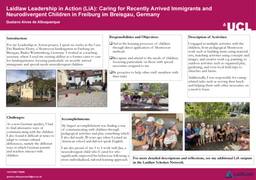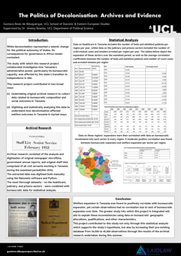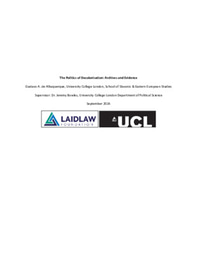Ethical Leadership and Global Citizenship: Lessons from Freiburg
My Leadership in Action programme involved spending six weeks in Freiburg, Germany, working in a Montessori kindergarten with neurodivergent children. This experience gave me invaluable lessons about ethical leadership and global citizenship, particularly regarding responsibility, dignity, patience, and cultural humility. I will share these lessons below using stories from my experience.
Ethical Leadership
The most powerful lesson I learned is that leadership is not about control, but about creating space for others to grow.
At Casa dei Bambini, I was struck by how German children were encouraged to take responsibility at a very young age—riding bikes to school, putting away belongings, cleaning up after themselves. Back in Brazil, adults tend to handle these tasks. At first, I thought independence at that age was too much, but I realised that children take pride in responsibility. As a leader, I now see that caring sometimes means stepping back, letting others learn by doing.
I also saw the ethical weight of communication. My supervisor told me to speak to children with the same tone and respect I would use with adults. To my surprise, the children responded with maturity. I realised that dignity is not tied to age or status—an ethical leader recognises everyone’s worth through respect.
My most personal lesson came from working with Jan, a neurodivergent child from Turkey who struggled with the school’s rigid expectations. While some staff grew frustrated, I felt more patient, perhaps because I was used to less orderly environments back home. Supporting Jan reminded me that ethical leadership requires empathy and inclusivity: meeting people where they are, not where we expect them to be.
Global Citizenship
Living abroad also reshaped how I view the world. I did not speak German, so I relied on observation and openness. This taught me that being a global citizen is not about mastering every culture, but about humility and a willingness to learn.
I learned to admire differences—such as Germany’s culture of independence—while also questioning them, like when a teacher worried that a child was unready for school simply because he sometimes forgot to organise his backpack. A global citizen, I realised, does not simply adopt new ways uncritically, but engages with them thoughtfully, recognising both strengths and limitations.
Most importantly, I discovered that despite language and cultural barriers, shared values—like care and dignity—connect us all.
Looking Forward
To continue growing, I plan to:
-
Practice active empathy, as I did with Jan, especially with people facing unique challenges.
-
Lead by dignifying others, ensuring my words and actions always affirm respect.
-
Stay globally curious, seeking new perspectives and reflecting critically.
Conclusion
My Leadership in Action journey taught me that ethical leadership is rooted in respect and empathy, and global citizenship in humility and openness. These lessons will guide me as I continue to grow into a responsible and ethical leader, ready to contribute to a global community.



Please sign in
If you are a registered user on Laidlaw Scholars Network, please sign in